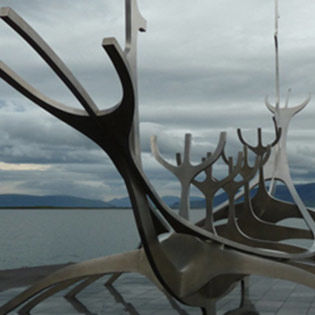Midlands Viking Symposium 2017
- Location
- Arts Building - University of Birmingham
- Dates
- Saturday 29 April 2017 (10:30-16:15)

The Universities of Birmingham, Nottingham and Leicester are proud to announce the 13th Midlands Viking Symposium, an event designed to bring together academics and enthusiasts in Viking Studies.
Speakers and Provisional Schedule
10.30 Welcome, Chris Callow (Birmingham)
10.45 Roderick Dale (Nottingham), ‘The Pillage People: Macho, macho men and the depiction of Viking warriors’
This talk will discuss depictions of Viking masculinity in modern popular culture and relate those depictions to medieval and Viking Age concepts of Viking masculinity. The focus will be on how the two differ, and how the modern depictions are used to create masculine identities and role models.
11.20 Gareth Lloyd-Evans (Oxford), Maintaining Masculinity: Interactions Between Men in the Sagas of Icelanders
This talk will explore how interactions between male characters in the Sagas of Icelanders are shaped by notions of masculinity, but will also examine the simultaneous role that such interactions play in the construction and maintenance of masculine ideals. Masculinity and male-male bonds in the Sagas of Icelanders will be shown to be mutually dependent and mutually reinforcing.
12.00 Matthew Roby (Oxford), “‘Skamm hafi þínar systr’: Promiscuous Troll Children and the Ridicule of Female Childhood Sexuality in Icelandic Legendary Sagas”
This talk will explore a motif, occurring in numerous late medieval Icelandic legendary sagas, which features the arrival and immediate demise of two troll-women at the hands of the sagas' heroes. In some instances, these episodes are imbued with a distinctly erotic dimension, depicting excessive lust, suggestive wrestling, and voyeurism. Intriguingly, it is only after they have been defeated that the texts convey the extremely young ages of these troll-women, who are really troll-children, leaving both heroes and readers to reconcile their previously unproblematised sexual thoughts with this unsettling revelation.
12.45-2.00 Lunch
2.00 Cat Jarman (Bristol), Repton: 873 and all that
The Anglo-Saxon Chronicle says the Viking Great Army attacked Repton in Derbyshire in 873, destroying the local double-house monastery and driving the Mercian king into exile in Paris. In the 1970s and 1980s, excavations in Repton uncovered not only evidence of the Viking winter camp, but also remains of the Anglo-Saxon monastic site and a number of distinctly “Scandinavian” burials. A charnel deposit under a shallow mound contained nearly 300 individuals, thought to be either members of the Viking Great army or the monastic population. This paper will present the results of two new lines of research at Repton. First, a multidisciplinary study of the people buried there, including new data on when they were interred and insights into their diet and geographical origins. Second, preliminary results of new fieldwork in Repton, which provides a better understanding of the Great Army’s impacts.
2.45 Bernadette McCooey (Birmingham) All in a day’s work? Gender and everyday life in Viking Age and medieval Iceland
Some of Iceland’s most famous sagas give the impression that Icelandic society had clearly defined gender roles. This talk challenges that idea by reassessing some of our evidence. In everyday life, where survival and the utilisation of available labour were important, we will see that gender made less of a difference to what people actually did than has sometimes been suggested.
3.30 Elisabeth Magin (Nottingham), Trader, doctor, wife—female identities in medieval Bergen
Originally founded by the king as a trading hub, the town of Bergen (Norway) evolved into a thriving community in the 13th century, with a diverse and international population. Men were not the only ones to take up new occupations in this new environment, however. Archaeological and runic evidence suggests that women as well were not restricted to traditional female roles in this new setting anymore. Women like Gyða, Solveig, Sigriðr and Ingibjorg have left us a chance to get a glimpse into their lives and stories in the form of a runic inscription. These inscriptions are part of the rich runic material discovered during town excavations in the 1950-70s, showing these women as businesswomen, wives and political actors. The talk will give an overview over the evidence, and provide insights how living in a town like Bergen might affect and change female professions and identities.
4.15 Event close
Cost
£30 per person, this includes registration, all hand outs, lunch and refreshments.
Current University of Birmingham staff and students can register for the discounted rate of £15.